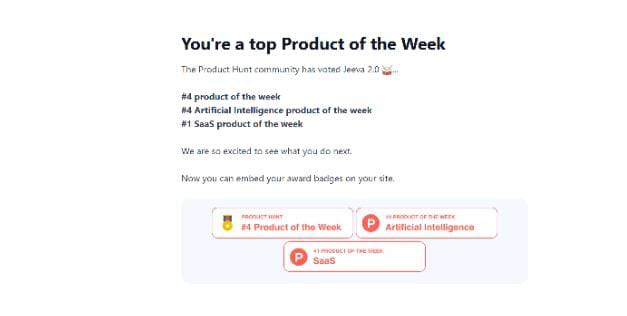Jeeva AI has pulled off a remarkable feat in the startup world – earning the coveted spot as Product Hunt’s SaaS Product of the Week. In late July 2025, the company’s Jeeva 2.0 launch garnered massive community support on Product Hunt, putting this AI-powered sales assistant platform in the weekly top position. This achievement is no small honor: Product Hunt is known for surfacing the best new tech products daily, and dominating its weekly leaderboard signals strong validation from tech enthusiasts and professionalsfi.co. For a young B2B SaaS startup, being #1 of the week on Product Hunt means exposure to thousands of potential users and a vote of confidence from one of the web’s most influential product communities. In this article, we’ll explore what Jeeva AI is, how the team orchestrated this successful launch, and what results they reaped from becoming Product Hunt’s SaaS Product of the Week.
Meet Jeeva AI – “Superhuman” Sales, Powered by AI
Jeeva AI is an “agentic AI” platform designed to automate the grunt work of sales so that human teams can focus on closing deals. Dubbed the “Cursor/Codex for sales reps,” the platform blends artificial intelligence with sales expertise to offload repetitive, time-consuming tasks from salespeople’s plates. From finding and enriching leads to drafting personalized outreach and following up, Jeeva acts like a superhuman sales assistant operating on autopilot.
Founded by CEO Gaurav Bhattacharya, the company’s vision is to free up sales teams’ time by embedding intelligent agents into every step of the go-to-market process. “Jeeva 2.0 is designed to empower every GTM team member, not just sales leaders, to become 10× more productive and effective,” says Bhattacharya. By automating busywork – email triage, meeting scheduling, note-taking, research prep, and more – Jeeva enables sales reps and even founders to focus on high-impact conversations instead of administrative drudgery. In practical terms, with Jeeva 2.0 the AI can now sort your inbox, label and draft replies, coordinate calendars, prepare briefing docs before calls, and even join meetings to take notes – all tasks that typically suck up hours of a sales rep’s week. This ambitious feature set positioned Jeeva 2.0 as a truly end-to-end sales automation solution just in time for its big Product Hunt debut.
Launch Day on Product Hunt: Jeeva 2.0 Makes a Splash
Jeeva’s team chose July 21, 2025 as the day to launch Jeeva 2.0 on Product Hunt – and they treated it like a major event. In the lead-up, the company built buzz on social media, encouraging followers to click “Notify me” on their Product Hunt upcoming page (so fans wouldn’t miss the launch). They also scheduled interactive events to rally support. “The launch on Product Hunt on July 21 will feature live demos, user stories, and a showcase of Jeeva’s new autonomous AI assistants,” a pre-launch press announcement highlighted. Indeed, on launch day the team hosted a live walkthrough demo of Jeeva 2.0 and engaged directly with early users – an approach aimed at turning curious visitors into upvoters and commenters.
When Jeeva 2.0 went live on Product Hunt, the response was immediate and enthusiastic. Upvotes began pouring in as the makers (Jeeva’s team) and early adopters shared the Product Hunt link across various channels. Within hours, Jeeva AI was trending at the top of the day’s leaderboard. The Product Hunt community showed up strong: by the end of the day, Jeeva 2.0 had amassed 725 upvotes and 177 comments, finishing as the #2 Product of the Day on July 21. It was a nail-biter of a race – the team came just shy of the #1 spot that day by only a small margin. “After a nail-biter on launch day, Jeeva 2.0 finished #2 Product of the Day on Product Hunt,” the Founder Institute noted in a news updatefi.co. Securing hundreds of upvotes and dozens of positive comments in a single day is a clear sign that the product struck a chord with the community. Many users chimed in with questions, feedback, and praise for the concept of an AI sales sidekick, while the Jeeva team diligently responded to each comment, amplifying the engagement. By all measures, launch day was a huge success, even if the golden kitty (the #1 daily spot) narrowly eluded them.
From #2 of the Day to #1 of the Week
The excitement didn’t end after launch day. Thanks to sustained momentum, Jeeva AI kept climbing in the rankings over the next few days. Product Hunt’s leaderboard for the week tallies the performance of all products launched in that week, and Jeeva 2.0 continued attracting upvotes and attention even after Day 1. By that weekend, Jeeva 2.0 had edged ahead of other launches to become the #1 Product of the Week in the SaaS category (and one of the top overall products of the week)fi.co. In other words, out of every tech product launched on Product Hunt that week, Jeeva AI’s launch garnered the most love from the community in its category. The team proudly shared that Jeeva AI hit the #1 weekly spot – a major milestone for the startup’s credibility. (According to Product Hunt’s official records, Jeeva 2.0 ultimately ended the week of July 21 ranked among the top five products overall, underscoring how competitive that week was on the platform.)
Earning Product of the Week is significant because daily rankings reset every midnight, but the weekly ranking shows sustained interest. Jeeva’s ability to stay in the conversation for days suggests that new visitors kept discovering the product, and existing supporters continued to champion it. By week’s end, Jeeva AI had close to a thousand Product Hunt users following its page, ensuring a built-in audience for future updates. The weekly win also means Jeeva was featured in Product Hunt’s weekly newsletter sent to the entire community, giving it additional exposure beyond those who browsed the site during launch. All told, becoming SaaS Product of the Week put Jeeva AI on the map for countless potential users, investors, and tech watchers who might have otherwise missed it.
Not by Luck – By Playbook: Keys to a Winning Launch
How did a relatively small startup manage such a splashy launch? According to the Jeeva team, it was “not by luck, but by playbook.” In other words, they credit careful strategy and execution for their Product Hunt success. Here are some of the key tactics from Jeeva AI’s launch playbook that helped them climb to the top:
- Preparation & Pre-Launch Buzz: The team treated the lead-up to launch like a marketing campaign. They teased the launch date weeks in advance on Twitter (X) and LinkedIn, highlighting Jeeva 2.0’s new features and the value it would deliver. They created a Product Hunt “Coming Soon” page for Jeeva 2.0 so interested followers could subscribe for launch alerts. By launch day, dozens of supporters had already clicked “Notify Me,” ensuring an initial burst of upvotes as soon as the product went live. This pre-launch subscriber base gave Jeeva a running start out of the gate.
- Rallying the Community Early: Jeeva leveraged its networks to build momentum in the crucial first hours. As soon as Jeeva 2.0 launched, the team reached out to friends, beta users, mentors, and the Founder Institute alumni community (Jeeva is a Founder Institute San Diego graduate) to encourage them to visit the Product Hunt page, upvote if they liked what they saw, and leave supportive comments. Many did just that, which boosted Jeeva 2.0 in the rankings and attracted more organic viewers. By securing ~200 upvotes in the early morning, Jeeva signaled to the Product Hunt algorithm that this launch was gaining traction, which helped it remain visible on the homepage throughout the day.
- Engaging Demo and Q&A: Rather than passively waiting for upvotes, the Jeeva team actively engaged visitors with a live demo and Q&A session. On launch day, they hosted a live walkthrough of Jeeva 2.0 (as mentioned, featuring real-time demos of how the AI automates sales tasks) and invited attendees to join in, ask questions, and share feedback. This interactive approach served two purposes: it showcased the product’s capabilities in a compelling way, and it fostered a sense of community participation. People who attended the demo were more likely to upvote and comment because they had a personal touchpoint with the makers. Even those who missed the live session got to see a recap that Jeeva shared on social channels later, keeping the conversation going. By educating users during the launch (instead of just saying “Here’s our product, please upvote”), Jeeva built trust and enthusiasm – which translated into more support on Product Hunt.
- Responsive, Personal Interaction: A hallmark of successful Product Hunt launches is the maker’s responsiveness in the comments, and Jeeva exemplified this. CEO Gaurav Bhattacharya and his team jumped into the Product Hunt comments section right away, answering every question and thanking users for their feedback. For example, when one user asked if Jeeva could do away with traditional CRMs, Gaurav replied with a thoughtful explanation within minutes. This level of attentiveness not only boosts the post’s comment count (which helps the ranking), but also shows potential users that the team is listening and cares. Throughout launch day, the Jeeva makers maintained an upbeat, appreciative tone – turning commenters into champions. This helped build a positive vibe around the product. By the end of the day, the discussion thread had nearly 180 comments, many of them sparked by the team’s prompts and replies. That genuine engagement left a great impression on the community.
- Multi-Channel Promotion: Jeeva didn’t rely on Product Hunt alone – they promoted the launch across multiple platforms to drive traffic. The team shared the PH link and updates on LinkedIn, Twitter/X, Facebook, Instagram, and even within niche Slack groups and forums relevant to startups and SaaS. Each post was tailored to its audience: on LinkedIn, for instance, Gaurav wrote a heartfelt story about the journey to build Jeeva 2.0 and invited colleagues to check it out; on Twitter, they used eye-catching visuals and the hashtag #ProductHunt to catch the eye of tech influencers. They even prepared a LinkedIn article after the launch titled “How we became Product Hunt’s #1 Product of the Week (Not by luck. By playbook.)” to share lessons learned – turning the success into a content marketing opportunity as well. By casting a wide net on launch day, Jeeva ensured that anyone remotely interested in AI or sales automation in their network knew something big was happening. This cross-platform push translated into consistent traffic and upvotes throughout the day and week.
- Leveraging a Trendy Category: Finally, part of Jeeva AI’s success was building a product that resonates with what the Product Hunt community loves: AI and productivity. The timing was excellent – 2025 has been a year of huge interest in AI-driven tools, and Jeeva sits squarely at the intersection of AI and SaaS for business. The Product Hunt crowd is quick to champion tools that promise to save time or boost efficiency, especially using AI. Jeeva 2.0’s value proposition (“save sales reps from grunt work using AI”) practically sells itself in this climate. By highlighting concrete benefits – e.g. “3x more pipeline, emails that write themselves, meetings auto-booked” – the team tapped into the excitement around AI automation. In short, Jeeva’s offering had Product Hunt appeal, and the team’s messaging emphasized that fit. This alignment with a hot trend gave their launch an extra tailwind that pure hustle alone might not achieve. It’s a reminder that even the best launch strategy works better if your product narrative resonates with current interests of the community.
Every step of the way, the Jeeva team executed their playbook methodically. They pre-seeded interest, activated their network, showcased the product’s strengths live, engaged authentically, and amplified the launch beyond the Product Hunt platform. None of these tactics are “cheats” or shortcuts – they are best practices for any startup looking to make a splash. Jeeva AI’s story shows that launching well is as much about community and communication as it is about the product itself.
The Payoff: Traction, Feedback, and New Opportunities
Becoming Product Hunt’s SaaS Product of the Week yielded immediate benefits for Jeeva AI. First and foremost, thousands of people in their target audience (startup founders, sales leaders, and tech enthusiasts) discovered Jeeva through the launch. The Product Hunt page itself drew significant traffic – over 1,000 new website visits came directly from Product Hunt referrals in the days following the launch, according to the team’s reports. Many of these visitors converted into leads: Jeeva AI saw 22+ demo requests originate from Product Hunt users in the week after launch (i.e. folks intrigued enough by the PH buzz to request a personal demo of the product). For a B2B SaaS focusing on quality over quantity, 22 hot leads in one week is a big deal, and it directly validates the effort spent on a Product Hunt campaign.
Additionally, the launch generated invaluable community feedback and social proof. With nearly 180 comments on the Product Hunt discussion, the Jeeva team gathered insights into what potential users care about – from integration questions (e.g. “Can it work without my CRM?”) to feature suggestions. This kind of real-world input is like gold for a product team refining its roadmap. The positive reactions served as testimonials too. Dozens of commenters and reviewers praised the concept of Jeeva AI, calling it a “game-changer” for sales and commending the team’s vision. By the end of launch week, Jeeva AI held a 4.7★ rating on Product Hunt, based on 60+ user reviews. These public reviews highlight pros like “reduced manual effort”, “personalized outreach”, and “enhanced engagement rates”, reinforcing Jeeva’s value proposition in the words of users themselves. Such social proof is incredibly useful for marketing and credibility – it signals to anyone considering Jeeva that people who have tried it really see the benefits.
The exposure also gave a boost to Jeeva’s community for the long term. Their follower count on Product Hunt jumped (approaching 900+ followers), meaning any future update or launch will automatically notify a large base of interested folks. The launch story was picked up and shared on platforms like LinkedIn and Twitter beyond Jeeva’s own posts – essentially free publicity. Even the Founder Institute published a news piece celebrating the launch, noting how Jeeva’s achievement exemplifies what scrappy startup teams can do (and subtly highlighting FI’s role in nurturing such startups). Investors and partners also tend to take note of a successful Product Hunt launch. While not publicly disclosed, it wouldn’t be surprising if Jeeva’s team received inbound inquiries from potential investors or strategic partners who saw the Product Hunt traction as a signal of market fit. At minimum, the launch gave Jeeva a great story to tell in pitch decks and sales calls – “#1 Product of the Week on Product Hunt” is a headline that opens doors and lends credibility.
Perhaps most importantly, the morale boost for the Jeeva team was immense. Launching a product is hard work, often with uncertain outcomes. Coming out of launch week with a top ranking, user love, and tangible leads is a huge validation for the team’s effort and vision. It energized the team to keep pushing forward. In interviews, Gaurav Bhattacharya expressed gratitude to the community and excitement for what’s next, saying that this launch proved the demand for automating sales workflows. The success also sets a benchmark – now they know what’s possible with a coordinated effort, and they’ve built a playbook they can reuse for future feature launches or even a broader Product Hunt relaunch down the line.
Conclusion: Beyond the Badge – What’s Next for Jeeva AI
Jeeva AI’s rise to Product Hunt Product of the Week is more than just a moment of glory; it’s a springboard for the startup’s next phase of growth. By leveraging a savvy launch strategy and an enthusiastic community, this small team achieved outsized visibility in a crowded SaaS market. But they’re not resting on their laurels. In the weeks following the launch, the Jeeva team has been following up with the new sign-ups and demo requests, turning those leads into happy customers. They’ve also been iterating on the product with the feedback gathered – for instance, exploring deeper integrations and new features that early users asked for during the launch discussion. The momentum is real: every new user brought in by the Product Hunt buzz is another potential advocate who can spread the word in their own circles.
Internally, the team is celebrating this win (rightfully so), but they view it as the beginning of a larger journey. Their mission to eliminate sales grunt work using AI has gained validation, and now it’s about capitalizing on it. We can expect to see Jeeva AI doubling down on content and community. They’ve hinted at more live webinars and tutorials to onboard users, and perhaps even a community forum for sales professionals to share automation tips. The Product Hunt playbook they executed so well will likely be used again – perhaps when Jeeva rolls out a major update or a new product module, we might see “Jeeva 3.0” aiming for Product of the Day or even Product of the Year. The team has also forged connections with many supporters through the launch (some commenters were influential figures in sales and tech), and those relationships could blossom into partnerships or advisory roles.
For now, Jeeva AI is enjoying the fruits of a launch done right: increased awareness, user acquisition, and community goodwill. Their story is a terrific case study for other SaaS startups on how to plan and execute a Product Hunt launch with precision. It shows that by engaging authentically with your audience and rallying your champions, even a small startup can beat the odds and top the charts. Jeeva’s achievement wasn’t luck – it was a testament to the power of preparation, a great product-market fit, and community-driven marketing. As they continue to build on this foundation, one thing is certain: a lot more people know the name Jeeva AI today than did a few weeks ago, and that’s positioning them strongly in the quest to transform how sales teams work.
In summary, Jeeva AI’s journey to becoming Product Hunt’s SaaS Product of the Week exemplifies the intersection of an innovative solution meeting effective storytelling and community engagement. It’s a reminder that behind every “overnight” success on launch platforms lies a well-crafted game plan. With Jeeva 2.0 now in the hands of users and a trophy from Product Hunt on the shelf, the startup is charging forward – turning the buzz into lasting business growth. And for the rest of us, they’ve generously shared a playbook that any founder can draw inspiration from the next time we aim to launch and land at the top.




































